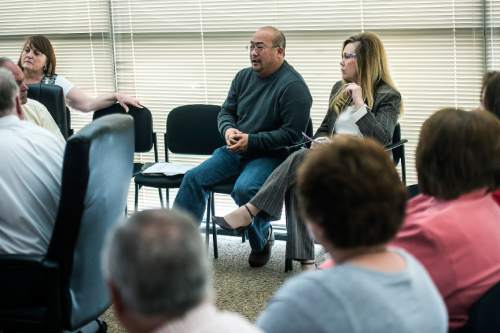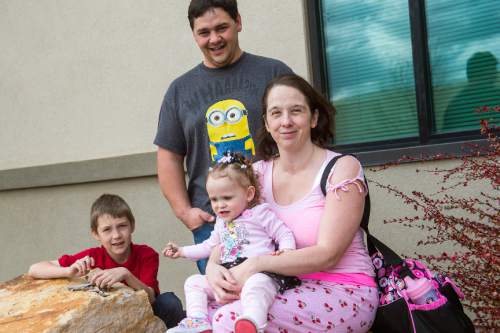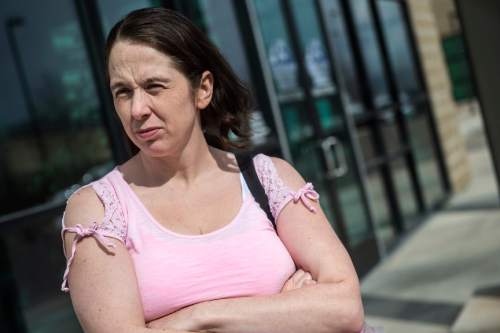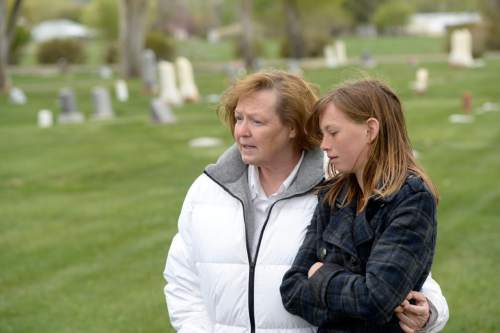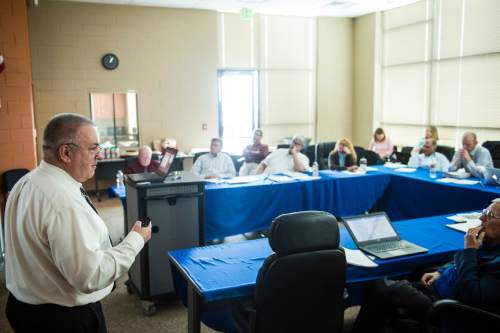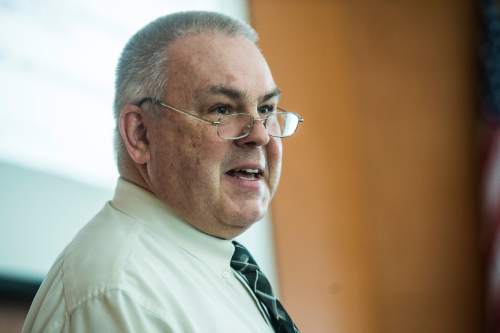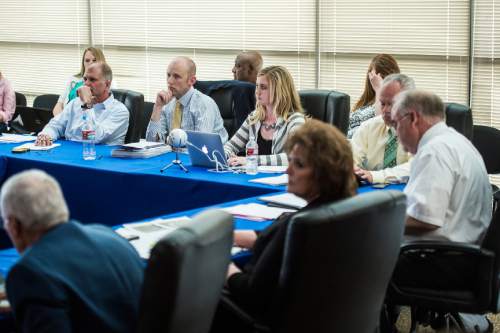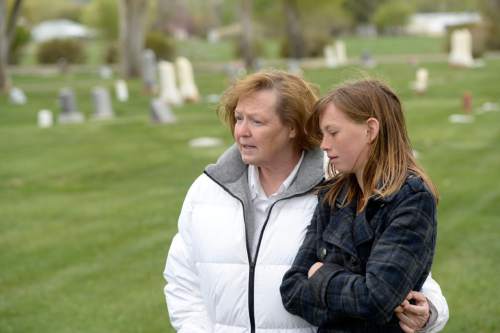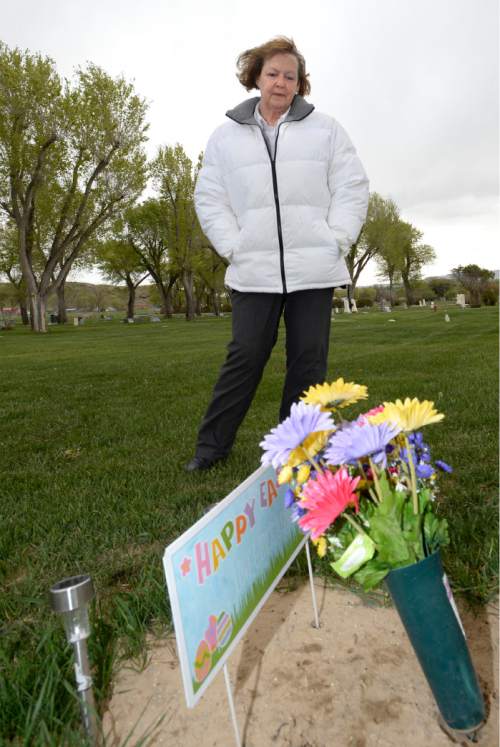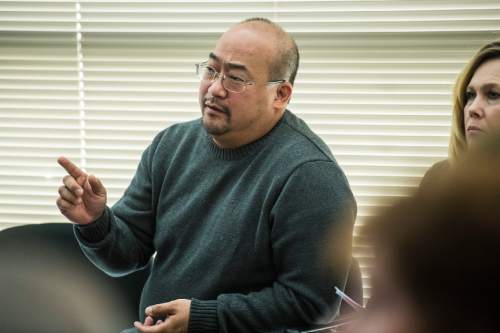This is an archived article that was published on sltrib.com in 2015, and information in the article may be outdated. It is provided only for personal research purposes and may not be reprinted.
Vernal • State epidemiologists have confirmed what a worried midwife suspected: More Uinta Basin babies were dying prematurely two years ago.
After one of her patients gave birth to a stillborn baby in May 2013, midwife Donna Young started documenting the fresh, tiny graves in this energy boom town's cemeteries. She suspected pollution from the region's burgeoning oil and natural gas fields.
The local hospital threatened her with legal action. Neighbors gave her the cold shoulder. The grieving mothers who initially told their stories of pain and loss clammed up.
But state and local health investigators backed up Young this week — to a point.
Delivering his report to the Tri-County Board of Health on Wednesday, epidemiologist Sam LeFevre said the increase in "adverse birth outcomes" is notable, even though it's not "statistically significant."
"From a local perspective, these findings should be concerning, particularly if these patterns persist," LeFevre wrote in the report.
"We did see more stillbirth and infant death than what would historically have been expected," he added in an interview.
But more study is needed to determine whether the uptick is a trend and the potential causes.
Tracking infant mortality and birth defect data from Daggett, Duchesne and Uintah counties, epidemiologists compared those numbers to birth outcomes in the rest of the state. The region logged 13 infant deaths and 13 stillbirths in 2012 and 2013, up from 11 infant deaths and nine stillbirths in 2010 and 2011.
Overall, investigators documented a total of 118 infant deaths and 85 stillbirths in the tri-county region between 1991 and 2013.
Young said Wednesday the study is "a good start, but it's not a solution."
Health department managers said they will revisit the study in two years and continue monitoring data from the Basin.
"Although the statistical differences between the TriCounty area and the state are minimal when it comes to adverse health outcomes, there are obviously patterns that raise some concerns for public health locally," said Jordan Mathis, TriCounty Health Department executive director. "It is important that we take measures to better understand these patterns."
Waiting for an appointment at the county health department Wednesday, mother of five Wendie Casper said she would like to see local health managers focus on the causes of stillbirths in Vernal.
The 38-year-old had a miscarriage five years ago when she was 15 weeks pregnant. She never learned exactly what went wrong but suspects that air pollution affects pregnancies in the area.
"I'm sure it does," she said.
Her husband Dave Casper, who works part-time for a paving company, said he would welcome any additional information.
"It's always good to know," the 38-year-old father said. "There's a lot of people in this area who have lost their babies."
The study from state and TriCounty Health Department officials took two years as investigators waited for data from 2013, the year of the suspected increase.
A town of 10,300 about 175 miles east of Salt Lake City, Vernal has grown as new oil and natural gas drilling technologies have helped unlock the Uinta Basin's hydrocarbon riches. The region produces 80 percent of the state's oil and gas, according to the Utah Department of Natural Resources.
The region's fossil fuel industries have followed a boom-and-bust cycle, stagnating in the late 1990s and picking up again around 2005.
The study authors considered a broader region encompassing Daggett, Duchesne and Uintah counties because Vernal is too small for a complete statistical review. Epidemiologists documented rates of stillbirth, infant death, birth defects and low-weight and premature births over 20 years in the region, which has a population of 53,600. That data was compared to historical averages for the tri-county area and rates from the rest of Utah.
The incidence of adverse birth outcomes in the Basin is about the same as the national average from a 2011 report, which is the most recent data available from the U.S. Department of Health and Human Services.
In the end, the three-county statistical sample may be too small to indicate any increased risk, LeFevre noted.
Genetics and maternal behavior also can play a role in birth outcomes. So the study's authors factored in differences in race, health and behavior between Uinta Basin mothers and others in the state. The most important risk factors that can lead to stillbirth and low birth weight include diabetes, tobacco use and inadequate prenatal care.
Compared to the rest of Utah, the region has elevated rates of adult women who smoke. Fewer residents visited the doctor for a checkup or had health coverage in 2013. And 40 percent of adults have jobs with a high risk of chemical exposure, such as farming or manufacturing.
Local health managers Wednesday largely dismissed questions about environmental factors and honed in on maternal behavior.
Mathis said he would like to bolster nutrition and maternal health programs as the Uinta Basin waits for the next two years of data. He does not believe the findings warrant a study of any potential causes.
"I don't know in my personal view that the data pushes us to that point yet," Mathis said. "I think we take appropriate measures and say, 'Let's address the factors that we know we can address,' and monitor it and then see."
Two years ago, Young started reading obituaries and mortuary records after a mother in her care lost a baby — the first-ever stillbirth in her 19-year career. She noted case after case where a Vernal-area mother gave birth to a stillborn baby or a baby died within a few days of birth.
Of the lost infants, four were born to mothers who lived or worked within a block of the same Vernal intersection.
Air quality advocates believe Young picked up on something.
Brian Moench of Utah Physicians for a Healthy Environment argues a local study on air quality and birth outcomes is needed.
"Given the raw data, we think there's every reason to have concern about it," he said. "Should we continue to allow this part of Utah to be a fossil fuel feeding frenzy?"
And Cherise Udell, founder of Utah Moms for Clean Air, said the report's findings do not surprise her because the Wasatch Front, where the majority of Utah's population lives, also has poor air quality.
Udell criticized researchers for identifying only "risky maternal behavior," rather than environmental factors, as a cause of adverse birth outcomes, "thus placing the bulk of the blame on the mother if she loses her baby or has an infant of low birth weight."
Young also pushed back at the notion her patients had some role in their babies' deaths.
"I think they need to look at a wider spectrum of what is causing it," she said. "I know that the women that I have looked into are not drug addicts. They don't smoke. They're not diabetic. They don't have chronic health conditions. They don't have inadequate prenatal care.
"There's something else going on."
Jeanette Carpenter, an obstetrician-gynecologist at the University of Utah, called the study a good first step, but noted it did not delve into environmental issues.
Carpenter, who is engaged in her own study of the health records of thousands of children born in Utah County in the 1980s when Geneva Steel was operating, said future studies should compare birth outcomes to pollution levels, neighborhood by neighborhood, if possible.
Moreover, she said, future studies should attempt to get more precision on risks — for instance, determining if women whose children fared poorly used wood-burning stoves in their homes.
Whether Uinta Basin doctors and residents follow up on the report is in question.
Further study of environmental factors would be expensive and invasive, LeFevre said, probing the sex lives, eating habits and DNA of residents. The decision of whether to conduct such a study rests with the TriCounty Health Department.
For now, Mathis said, the department will not go there. He acknowledged Wednesday the issue has polarized the community.
"I don't think that the study provided closure for people that are on the far sides of the issue," Mathis said. But he hopes it will spark a "civil discourse," adding that "all of us care, care about the health and well-being of our children."
Twitter: @anniebknox


